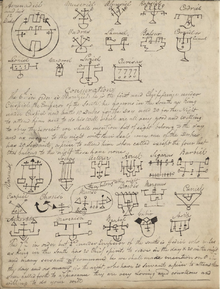This article needs additional citations for verification. (May 2014) |

An incantation, a spell, a charm, an enchantment, or a bewitchery, is a magical formula intended to trigger a magical effect on a person or objects. The formula can be spoken, sung, or chanted. An incantation can also be performed during ceremonial rituals or prayers. In the world of magic, wizards, witches, and fairies are common performers of incantations in culture and folklore.[1]
In medieval literature, folklore, fairy tales, and modern fantasy fiction, enchantments are charms or spells. This has led to the terms "enchanter" and "enchantress" for those who use enchantments.[2] The English language borrowed the term "incantation" from Old French in the late 14th century; the corresponding Old English term was gealdor or galdor, "song, spell", cognate to ON galdr. The weakened sense "delight" (compare the same development of "charm") is modern, first attested in 1593 (OED).
Words of incantation are often spoken with inflection and emphasis on the words being said. The tone and rhyme of how the words are spoken and the placement of words used in the formula may differ depending on the desired outcome of the magical effect.[3]
Surviving written records of historical magic spells were largely obliterated in many cultures by the success of the major monotheistic religions (Islam, Judaism, and Christianity), which label some magical activity as immoral or associated with evil.[4][unreliable source?]
- ^ Cite error: The named reference
:0was invoked but never defined (see the help page). - ^ Conley, Craig (2008). Magic Words, A Dictionary. San Francisco: Weiser Books. p. 40. ISBN 978-1-57863-434-7.
- ^ Conley, Craig (2008). Magic Words:a dictionary. San Francisco: Weiser Books. pp. 23–27. ISBN 978-1-57863-434-7.
- ^ Davies, Owen (8 April 2009). "The top 10 grimoires". The Guardian. Retrieved 24 October 2017.